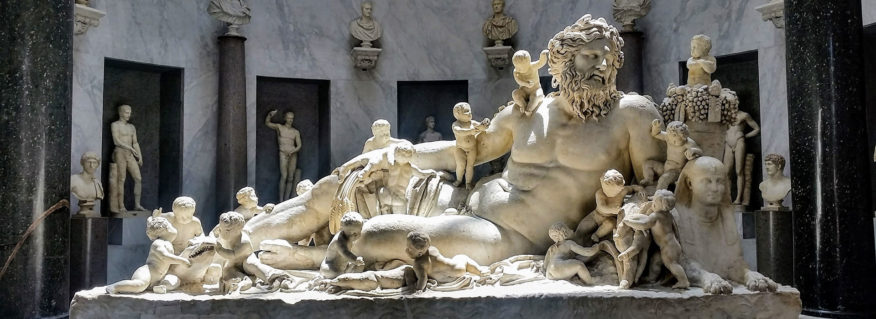Republished with permission by Vista, see original article here
Photo by Francisco Ghisletti on Unsplash
The topic of this article may seem a bit odd. Not least since, to a large extent, today’s Europe is perceived as a ”godless continent”. As an example, data from the European Social Survey 2014–16 showed that in twelve of the European countries a majority of 16- to 29-years-olds confessed to no religion at all – meaning they did not self-identify as religious, never prayed to God, and hardly ever attended a religious ceremony (1)
Obviously, this is not the whole picture. While countries like the Czech Republic, Estonia and my own country Sweden qualify as some of the most secularized in the world, countries like Poland, Lithuania and Ireland still stand strong when it comes to Christian faith.
However, one of the foundational truths of both the Old and New Testament is that the real question is not whether we worship – but what we worship. No matter how “secularized” you are, you will ultimately direct your worship and trust in one direction or the other.
Also, as all readers of Scripture should know: the struggle between competing gods does not end with us confessing Jesus Christ as our Lord and Saviour. There will always be gods and powers and trends and ideologies that command our worship.
The Bible speaks of these things as idols, where idols take the shape of physical entities. Paul speaks of “images made to look like a mortal human being and birds and animals and reptiles” (Rom 1:23). In Europe, however, the ordinary “gods” are of another kind. We don’t visit temples with golden statues to give our offerings or burn our incense. Instead, our gods tend to be of a more subtle, and often more ideological, kind.
The most obvious candidate should probably be the worship of the self, that goes back all the way to the garden of Eden, but is more prominent than ever in the postmodern European culture. More often than not we tend to put ourselves and our feelings at the centre of our worldview. Everyone has his or her own truth, and the customer is always right. And ultimately it is the question of power: do I surrender to God, or do I myself want to be a god? Is it probably impossible to follow Jesus today without seriously challenging the idol of self-centredness.
And then we have the eternal issue of money, wealth and consumerism. In his parable of the Sower, Jesus speaks about how “the worries of this life, the deceitfulness of wealth and the desires for other things come in and choke the word, making it unfruitful” (Mark 4:19). Not least in the wealthy parts of our continent, this is a devastating spiritual truth. And it is even more poignantly underscored in the Sermon on the Mount: ”No one can serve two masters. Either you will hate the one and love the other, or you will be devoted to the one and despise the other. You cannot serve both God and money” (Matt 6:24).
To complete the classic triad, we need to say something also about sex. As often as the New Testament warns us about greed, it also warns us about adultery and fornication. And to everyone with eyes to see, it is obvious that our culture is obsessed with sex. Free sexuality has become a central self-expression value of our time, and the pressure to be sexually active is strong already in the early teens – often triggered by the all-too-accessible internet porn.
Knowing all this, our focus ought to be the realization that the biblical call to holiness is also a call to denounce the idols. As the apostle puts it in a famous passage: ”Put on the full armour of God, so that you can take your stand against the devil’s schemes. For our struggle is not against flesh and blood, but against the rulers, against the authorities, against the powers of this dark world and against the spiritual forces of evil in the heavenly realms” (Eph 6:11–12).
If we want to survive in today’s Europe, we actively need to challenge the gods of our time.. For, as Jesus himself put it: “You cannot serve both God and …” If we actively serve the gods of Europe, we may in the end find ourselves not worshiping the God of the Universe.
Interestingly, this is also the basic conclusion in last year’s report from the Barna Institute in America. In their book Faith For Exiles, subtitled “5 Ways for a New Generation to Follow Jesus in Digital Babylon”, David Kinnaman and Mark Matlock present interesting findings from the Institute’s research.
In Kinnaman’s earlier studies unChristian and You Lost Me, the focus was on youth and young adults who had left the Christian community. But in Faith For Exiles the focus is shifted to look into the lives and attitudes of those who remain. Five specific traits are singled out. But before we look at these it is worth looking at the description Kinnaman and Matlock give of the present Western culture. (2)
“Christians whose understanding of the world is framed by the Bible can think about our experience as living in a shift from Jerusalem to digital Babylon. These are two of the ways human society is depicted in the Bible, and they endure today as helpful archetypes of civilization. … Through screens’ ubiquitous presence, Babylon’s pride, power, prestige, and pleasure colonize our hearts and minds. Pop culture is a reality filter. Websites, apps, movies, TV, video games, music, social media, YouTube channels, and so on increasingly provide the grid against which we test what is true and what is real. … Screens demand our attention. Screens disciple.” (3)
And later on: “We believe many parents, educators, pastors, and other leaders are trying to prepare young Christians for Jerusalem, to keep them safe and well protected for a world they no longer live in. Cultivating faith for exiles means, by contrast, that we–young and adults alike–trust that Jesus is Lord even in chaotic, pixelated, no-rules digital Babylon. A Christian identity and a rarely engaged church community are not enough to make someone resistant to the Babylon virus.” (4)
The point is simply this: If we are to survive – and thrive – as disciples in digital Babylon, we need to actively challenge the gods of our culture. Not doing so, means we will be severely infected by the “Babylon virus”, and in many cases lose our Christian faith.
So, what are the five traits of those “resilient exiles” that David Kinnaman and Mark Matlock have singled out in their research? In a summarized form, they can be described as follows:
- They have an intimate relationship with Jesus Christ. This trait corresponds with today’s focus on identity and identity issues: To be a resilient exile in Babylon, we need to find our identity in Christ, not reducing our faith to a “cool brand” to attach our identity to.
- They build the muscles of cultural discernment. In an age marked by complexity, stress and anxiety, where most people look to their smart phones (i.e. Google, YouTube and various chat forums) for answers to life’s questions, resilient exiles go straight to the Source for finding answers: The Scriptures.
- They forge meaningful, intergenerational relationships. In an age where individualism, loneliness and mistrust abounds, resilient exiles thrive in churches that can truly be labelled intergenerational. I.e. communities where people actually like to form intergenerational relationships.
- They are trained for vocational discipleship. They don’t accept the “sacred–secular divide”, but find their calling on different arenas in society – not as a way of departing from church, but “being church” where they are.
- They curb entitlement and self-centered tendencies by engaging in countercultural mission. No matter what arena they find themselves on, they actively identify with the kingdom of God and challenge cultural norms.
My belief is that we, as Christians in today’s culture, need to have an awareness of the competing gods of digital Babylon. We need to realize that behind the trends and ideologies and mindsets that we face, there are spiritual realities–and if we don’t challenge these, we will find ourselves sucked into worshiping other gods than our Saviour Jesus Christ.
Therefore, we need to foster spiritual practices that make us less vulnerable to the pressure of these gods. We need to actively
- foster a mindset that challenges the idol of individualism and self-centeredness.
- find ways of stewardship that challenge the idol of money, wealth and consumerism.
- create habits that help us to stand firm in the pressure from hedonism, pornography and illicit sex.
Without this awareness, and the spiritual practices that accompany it, it will be very hard to overcome the gods of Europe either on a personal or an institutional level.
Endnotes
- See for instance Harriet Sherwood, ”’Christianity as default is gone’: the rise of a non-Christian Europe” in The Guardian 2018-03-21.
- Obviously, Barna Institute is primarily concerned with Northern American culture, but given the general cultural similarities and, more specifically, the globalization of today’s youth culture, I dare say most of their findings have a relevance for the European situation.
- David Kinnaman and Mark Matlock, Faith For Exiles: 5 Ways for a New Generation to Follow Jesus in Digital Babylon (Baker Books 2019), p 20, 24–25.
- Ibid., p 28.
Olof Edsinger is General Secretary of the Swedish Evangelical Alliance, and his voice is often heard in both Christian and secular media in Sweden. He is the author of about fifteen books, mostly about the Bible and Christian discipleship. Earlier on, Olof worked as General Secretary of Salt, which is the youth and children’s organisation of the Swedish Evangelical Mission. He is married to Mona and they have three children. Together they have also been involved in a church plant in their home town Uppsala.



